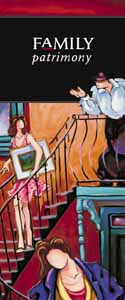 |
< Back
 FAMILY PATRIMONY
FAMILY PATRIMONY
 
Mine! Yours! Whose?
On July 1st, 1989, the provisions of the law instituting the family patrimony came into force. The purpose of this legislation was to favour economic equality between spouses and to put an end to the injustices of which the poorer spouse could sometimes be the victim especially where the spouses had chosen the matrimonial regime of separation as to property. The effect of this law is to provide for the equal partition (i.e. division) of the value of the family patrimony assets in the event of the death of one of the spouses, or a judgment of separation as to bed and board, divorce or nullity of marriage.
DOES THE NEW LAW APPLY TO YOU?
All legally married couples, no matter what the date of their marriage and regardless of their matrimonial regime, are subject to the provisions of this law. As a general rule, spouses are required to divide the family assets between them, whether or not they have signed a marriage contract, and whether or not they have children.
EXCEPTIONS
The following couples are not required to comply with the partition of the family patrimony:
- those who renounced the family patrimony before January 1st, 1991;
- those who filed a petition for divorce, separation as to bed and board or annulment of marriage in court before May 15, 1989;
- those who ceased living together before May 15, 1989, and had settled the consequences of their separation by way of written agreement or otherwise.
The rules concerning the partition of the family patrimony do not apply to spouses living in a de facto marriage.
WHAT ARE THE FAMILY ASSETS?
The family patrimony is composed of the following property owned by one or the other of the spouses:
- the residences of the family or the rights which confer use of them
- the movable property with which they are furnished or decorated and which serves for the use of the household
- the motor vehicles used for family travel
- the benefits accrued during the marriage under a
- retirement plan (except, in the event of death, a
- retirement plan governed or established by a law that grants a right to death benefits to the surviving spouse)
- the earnings of each spouse registered during the
- marriage pursuant to the Act respecting the Québec Pension Plan or similar programs (except in the case of death)
However any such property received by either spouse before or during the marriage by way of gift or succession, or its reinvestment, is excluded from the family patrimony.
WHAT RIGHTS DO I HAVE DURING THE MARRIAGE ?
Until the marriage comes to an end, the rules concerning family assets do not conflict with the right of ownership each spouse has in his or her own property. Each spouse remains free to dispose of his or her assets, subject to restrictions which have been enacted to protect the family residences (the owner spouse may not sell or hypothecate it without the written consent of the other spouse if it has fewer than five dwellings) and property serving for the use of the household (the owner spouse may not alienate, hypothecate or remove it from the family residence without the consent of the other spouse). There are other restrictions resulting from the matrimonial regime (for example, a spouse married under the regime of partnership of acquests may not give away, during his or her lifetime, any acquest without the consent of the other).
In short, the law does not make the spouses co-owners of the property included in the family patrimony, but rather, creates a right to partition the value of such property at the end of the marriage.
WHEN DOES PARTITION TAKE PLACE ?
The partition of the family patrimony takes place as a result of separation as to bed and board, divorce, nullity of marriage, or the death of one of the spouses. It is only then that the value of the family patrimony is split equally, unless the court, in exceptional circumstances, decides otherwise.
HOW DO WE PROCEED WITH THE PARTITION ?
When it is time to partition the family patrimony, its value is established on the basis of fair market value. However, certain relatively complex deductions are allowed. It is best to refer to a proper specialist, the notary.
In view of the family patrimony provisions, you should consult your notary, since,
- if you are future spouses, it would be wise to list the property you own at the time of your marriage and specify its value in a marriage contract;
- if you are already married, it might be appropriate to make changes to your marriage contract or your will.
Consult your notary: he leaves nothing to chance.
|








